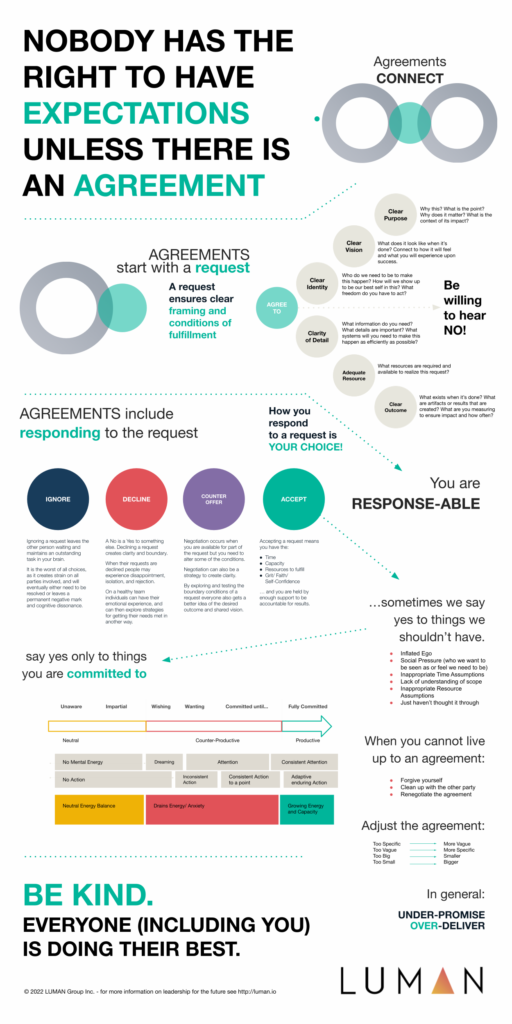“You got this, right?” your boss or colleague asks in the middle of the weekly meeting when a new topic comes up — blithely handing over a whole area of responsibility without even fully looking at you for more than a second. You heard yourself say “Yes, sure,” even while your whole body was screaming: “WTF, I thought this was your job?” While you process the shock and try and find your feet again, a few ideas are thrown around the room, everyone seems to have some “great ideas”. Maybe a few actual tasks are written down, but by the time the meeting is over and you get back to yourself, you have no idea what you just agreed to.
We have heard the same story from people again and again about leaving meetings shocked about having just taken on something that they don’t actually even understand, never agreed to, but are expected to somehow deliver on.
Instead of clear agreements, there are assumptions and non-verbalized expectations we hold toward each other, there are declarations and assertions, and there is the all too common auto-enrollment of “you got this, right?”.
Productive Capacity
People are capable of collectively constructing whole cities, particle accelerators and rockets to take us up to space — but often behind schedule or over budget.
In the day to day life of teams, simple project management falls short of delivering promised outcomes — even after various leadership or “agile training”.
There are both strategic and cultural reasons for missed deadlines, unclear expectations, anxiety and stress caused by ambiguity and lack of trust, and an overall sense that things are not going the right way, whether it is manifesting as a personal impostor syndrome, conflicts with colleagues, or simply as a sense of general unease about where things are at in the world.
Strategic Failures
Strategic failures typically revolve around around a lack of purpose and a lack of process for turning purpose into measurable outcomes:
- Unclear Purpose
A purpose requires personal meaning for whoever is in ownership of the outcome, the transformation or shift that takes place, to then create a specific impact. Purpose is why you are doing this in the first place. If meaning, transformation, and impact are not clearly understood, it will be difficult to fulfill on it. - Weak Vision
To bring something into the world, we first have to imagine it. What will the world look like when it’s done? Imagining completion, and moreover the emotional reward of completion, creates motivation and a pull toward the future. Without vision, a task is just a “thing to get done” with no understanding of what excellence looks or feels like. - Unstructured Portfolio
To get something done takes action. What are those areas of activity, what is the order of activity, what are the milestones of outputs, who will use then and what for? Incongruent levels of detail or prioritization, and undefined levels accountability will leave teams confused and lost in non-value add busy work. - Lack of progress indicators
In order to dynamically measure whether you are on track toward achieving your purpose, you need clear progress indicators not static goal lines (that are often made up and intimidating nor based on actual agreements). Only tracking goals instead of tracking deltas and habits, will enforce fixed mindsets and lead to avoidance behaviors.
Cultural Failures
Organizations are made up of people. We can structure our work so we can manage what it takes to accomplish our purpose, but without clear agreements to ensure everyone is truly in ownership there will be much confusion and wasted efforts.
Cultural failures in project management tend to be due to unclear agreements made by individuals who are missing key capacities for conscious contracting compounded by project management systems that do not reinforce a process for creating good agreements.
Making clear agreements that ensure everyone is truly in ownership, requires a different culture and leadership then what has worked in times of relative stability. In times of stability, implicit agreements can crystalize overtime into “how we do things around here”. When external conditions are changing, tools are changing, new generations with different vocabulary and values moves in or the bank crashes, you need clear explicit agreements to effectively move forward.
Capacity to Make Good Agreements
We teach leaders and teams the fundamentals of making clear agreements. In order to make a good agreement you must have
- Clear conditions of fulfillment
- The time, capacity and resources to fulfill on those conditions
- The safety to speak up if you do not, to ask questions, and to either decline or renegotiate the agreement if you can’t agree to it in good conscience
- And a meaningful place to record those details
When teams have clear agreements they can rely on each other and delivery in work in remote and hybrid environments without wasting time.
The result is increase in
- Productivity
- Capacity to create and innovate
- Level of trust in each other — making work a collaborative (and more fun) adventure.
Individual Development
This all sounds very clear and obvious. But according to psychologist Robert Keagan, about 65% of adults are on a socialized level of adult development or below. A the socialized level of development, there is still an assumption of external authority. In other words, socialized people are driven by expectations of others instead of from an internal, authentic self-authoring sense of self.
Most people, when given a task by authority will say yes because they have been socialized to say yes to authority, not because they are actually checking in with themselves to ensure that they have the capacity to fulfill on the agreement.
It is not surprising that instead of agreements that can be fulfilled on, there is a web of expectations placed on each other that causes stress in the form of paralysis and avoidance behaviors, covering your a** activities, escapism and blame games.
How then can people make clear agreements with each other?
Individuals make up teams, and teams make up organizations. If we want to create organizations that live up to their agreements we get to start with how each of us is dealing with agreements:
- How we are making agreements
- How we are renegotiating agreements when things change
- and how we are clearing agreements when we break them, so that we can always come from a place of integrity and accountability.
What kind of future could we create with better agreements?
Below an infographic to support you in improving the quality of yours. At LUMAN we empower leaders and their teams to create the future.






